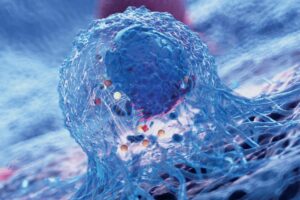What is already known
The treatment for HIV, called antiretroviral therapy (ART), is aimed at reducing a person’s viral load to an undetectable level and has helped people with HIV to live longer, healthier lives. However, people treated with ART have increased rates of inflammation-related conditions. These comorbidities have been linked with an altered microbiota, but it’s unclear whether microbiota alterations precede or follow HIV-associated inflammation.
What this research adds
Researchers analyzed stool and blood samples from 138 people with HIV, 53 of whom either had an accompanying condition or died at a later point. Compared to controls, people with HIV who were treated with ART had lower levels of gut bacteria that produce short-chain fatty acids (SCFAs) — a class of microbial metabolites that have anti-inflammatory properties. Alterations in the gut microbiota, including a reduced conversion of lactate to the SCFA propionate by gut microbes, preceded morbidity and mortality in people with HIV.
Conclusions
The findings suggest that the conversion of dietary fiber or lactate to SCFAs influences comorbidity risk associated with HIV.
Although HIV treatment has helped people with HIV to live longer, healthier lives, it often leads to inflammation-related conditions. New research indicates that alterations in the gut microbiota, including changes in the production of anti-inflammatory metabolites called short-chain fatty acids, precede morbidity and mortality in people who are treated with anti-HIV therapy.
The findings, published in Cell Reports, suggest that the microbial production of short-chain fatty acids influences comorbidity risk associated with HIV.
The treatment for HIV, called antiretroviral therapy (ART), is aimed at reducing a person’s viral load to an undetectable level. But people treated with ART have increased rates of inflammatory comorbidities. “Prior studies have linked specific microbiota composition patterns with HIV status and markers of inflammation and disease progression,” the researchers say. However, they add, it’s unclear whether microbiota alterations precede or follow HIV-associated inflammation.
The team — led by Irini Sereti at the National Institute of Allergy and Infectious Diseases in Rockville, Maryland — set out to address this question by analyzing stool and blood samples from 138 people with HIV.
Anti-inflammatory metabolites
Of the 138 study participants, 53 either had an accompanying condition or died at a later point. Comorbidities included cardiovascular disease, cancer and chronic kidney disease.
People with HIV who later died had a substantially lower microbial diversity in their gut microbiota compared to healthy controls. The abundances of several Lachnospiraceae and Ruminococcaceae bacteria were also lower in people with HIV who later died, as well as in those who developed cardiovascular disease.
In the human gut, Lachnospiraceae and Ruminococcaceae are two major producers of short-chain fatty acids (SCFAs) — a class of microbial metabolites that have anti-inflammatory properties. By analyzing data from six independent studies, the researchers validated the finding that people with HIV who received ART had lower levels of gut bacteria that produce SCFAs.
Microbial target
Because gut microbes metabolize dietary fiber to SCFAs and produce lactate as a byproduct, the researchers analyzed the ability of the gut microbiota to convert lactate to the SCFA propionate in people with HIV.
Compared to healthy controls, people with HIV had higher levels of lactate in their stool. Elevated fecal lactate, as well as a reduction of gut microbial enzymes involved in the conversion of lactate to propionate, were also observed in individuals with HIV who later died.
“[People with HIV] exhibit a loss of microbiome-encoded capacity to produce SCFAs including butyrate and propionate in the Lachnospiraceae and Ruminococcaceae families,” the researchers say. The findings, they add, suggest that microbial production of propionate could be a target for modulating the risk of inflammation-related comorbidities in individuals with HIV.











